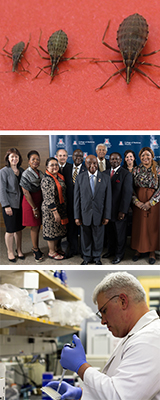 The UANews has run several articles over the past month of interest to faculty and staff in the Department of Medicine. Those include:
The UANews has run several articles over the past month of interest to faculty and staff in the Department of Medicine. Those include:
- "UA Gets $10.3M to Study Alzheimer's in Women"
- "UA Positioned to Help Train Health Workers in Liberia"
- "New Spanish-Language Classes for Health Sciences"
- "How Your BMI Might Affect Your Brain"
- "UA Team Questions Safety of Nutritional Supplement Selenium"
- "Supercomputers Could Improve Cancer Diagnostics"
- "UA Researcher Gets Grant for Ovarian Cancer Screening Device"
- "UA Medical Students Launch Online Journal of Medicine"
- "Alumni Couple's Gifts to Benefit Generations of UA Students"
- "UA Receives $1.9M Award to Test Computer-Assisted Surgical Training"
- "UA Researchers Launch App to Help Track Zika Virus"
- "UA Helps Bisbee Community With Kissing-Bug Problem"
- "UA Undergraduate Investigates How Gender Influences Stroke Response"
- "UA Partners on Study to Improve Cognition in Older Adults"
Scroll down for details…
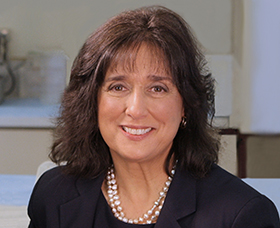 OCT. 18, 2016
OCT. 18, 2016
"UA Gets $10.3M to Study Alzheimer's in Women"
A five-year National Institute on Aging program project grant will be led by Roberta Diaz Brinton, PhD, inaugural director of the Center for Innovation in Brain Science at the UA Health Sciences…
Click here for original story.
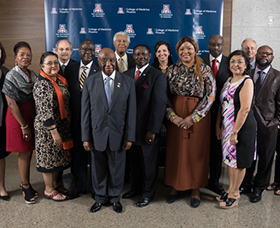 Joseph Boakai Sr. (sixth from left), vice president of Liberia, met on Monday with representatives of five colleges at the UA Health Sciences to establish a collaboration agreement.
Joseph Boakai Sr. (sixth from left), vice president of Liberia, met on Monday with representatives of five colleges at the UA Health Sciences to establish a collaboration agreement.
OCT. 18, 2016
"UA Positioned to Help Train Health Workers in Liberia"
Joint programs could send UA-trained health professionals to the West African nation, which has been decimated by war and illness and now has fewer than 50 medical doctors, says Akinlolu Ojo, MD, MPH, PhD, UA nephrologist and associate vice president for UA Health Sciences Clinical Research and Global Health Initiatives.
 OCT. 18, 2016
OCT. 18, 2016
"New Spanish-Language Classes for Health Sciences"
The aim is to improve population health outcomes by better preparing health care providers working among Spanish-speaking populations. The classes will begin next spring.
 OCT. 17, 2016
OCT. 17, 2016
"How Your BMI Might Affect Your Brain"
A healthy weight may be good for your brain. UA researchers found that older adults with higher body mass index tend to have more inflammation in the body, which in turn may negatively impact cognition. The research may provide valuable insights for possible interventions.
ALSO SEE:
"Campers Learn About Food, Fitness" | "In This Lab, Two Heads Are Better Than One"
A UA-led clinical trial found that selenium supplementation did not prevent colon polyps and may increase the risk of Type 2 diabetes.
OCT. 14, 2016 "UA Team Questions Safety of Nutritional Supplement Selenium"
"UA Team Questions Safety of Nutritional Supplement Selenium"
Studies have shown a deficiency of selenium to be associated with cancer risk. However, a UA-led study headed by Peter Lance, MD, deputy director of the UA Cancer Center, indicates the supplement significantly increased the risk of developing Type 2 diabetes.
Click here for original story.
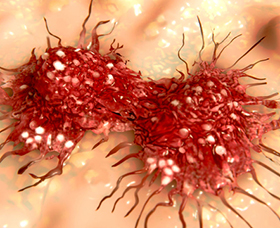 OCT. 12, 2016
OCT. 12, 2016
"Supercomputers Could Improve Cancer Diagnostics"
UA researcher Adam Buntzman, PhD, a researcher in the BIO5 lab of Monica Kraft, MD, is merging computer science and immunology to improve cancer diagnostics by up to 100 times the accuracy of conventional tests.
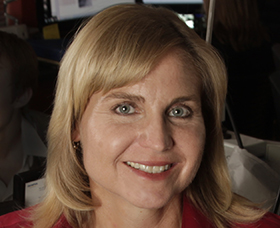 Jennifer Barton: "Effective screening for early detection (of ovarian cancer) is a compelling problem and a fantastic technical challenge because there's no perfect solution today."
Jennifer Barton: "Effective screening for early detection (of ovarian cancer) is a compelling problem and a fantastic technical challenge because there's no perfect solution today."
OCT. 11, 2016
"UA Researcher Gets Grant for Ovarian Cancer Screening Device"
A four-year National Institutes of Health grant totaling nearly $1.3 million will help UA professor of biomedical engineering Jennifer Barton, PhD, in developing a novel tool that would be used to identify the earliest signs of the cancer.
Click here for original story.
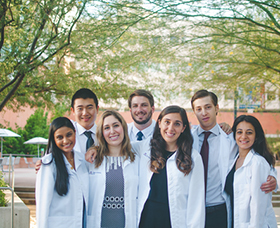 Journal members include (from left) Rohini Patel, Alex Liu, Tania Hassanzadeh, Weston LaGrandeur, Maryam Gilpatrick, Joseph Frankl and Vicky Khoury. (Photo: Aimee Le)
Journal members include (from left) Rohini Patel, Alex Liu, Tania Hassanzadeh, Weston LaGrandeur, Maryam Gilpatrick, Joseph Frankl and Vicky Khoury. (Photo: Aimee Le)
OCT. 3, 2016
"UA Medical Students Launch Online Journal of Medicine"
A research journal founded by two UA medical students will provide a platform to promote the intellectual curiosity and scientific achievements of students within the college.
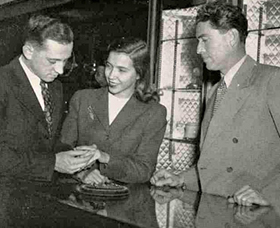 Donald, left, and Luda Soldwedel appeared in a jewelry store ad that ran in the UA yearbook.
Donald, left, and Luda Soldwedel appeared in a jewelry store ad that ran in the UA yearbook.
OCT. 3, 2016
"Alumni Couple's Gifts to Benefit Generations of UA Students"
Four endowed funds bearing their names will permanently support endeavors and students in the College of Humanities Writing Skills Improvement Program, the School of Journalism, the Eller College of Management and UA Health Sciences. A fifth endowed fund will provide money for an Arizona Athletics scholarship.
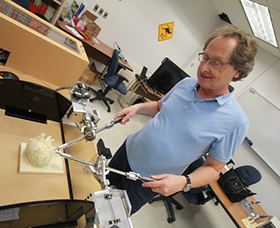 UA Distinguished Professor Jerzy Rozenblit demonstrates his Computer-Aided Surgical Trainer.
UA Distinguished Professor Jerzy Rozenblit demonstrates his Computer-Aided Surgical Trainer.
SEPT. 29, 2016
"UA Receives $1.9M Award to Test Computer-Assisted Surgical Training"
College of Engineering and College of Medicine researchers—including Jerzy Rozenblit, PhD, and Allan Hamilton, MD—are developing a computerized device to train medical students in laparoscopic surgery better than a surgeon could.
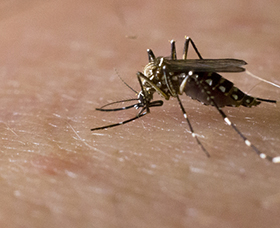 SEPT. 27, 2016
SEPT. 27, 2016
"UA Researchers Launch App to Help Track Zika Virus"
Kidenga, a community-based disease detection system, allows public health investigators to track mosquito populations within a community and identify people with symptoms of illness.
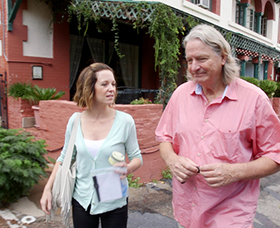 With many of its houses built on uneven, rocky foundations, the southern Arizona city of Bisbee is a haven for kissing bugs, which pose serious public health concerns. (Photo: Bob Demers/UANews)
With many of its houses built on uneven, rocky foundations, the southern Arizona city of Bisbee is a haven for kissing bugs, which pose serious public health concerns. (Photo: Bob Demers/UANews)
SEPT. 21, 2016
"UA Helps Community With Kissing-Bug Problem"
Some residents of the city of Bisbee, Ariz., 90 miles southeast of Tucson, have concerns about the bugs, whose bite can trigger an allergic reaction and also transmit disease. UA researchers —including Steven Klotz, MD, and Shannon Smith (pictured left) from the Division of Infectious Diseases—are working with local health officials, and here is what they have found. With UANews video.
Click here for original story.
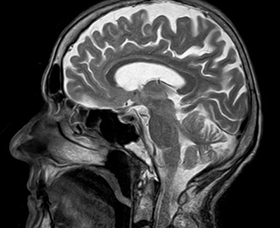 SEPT. 21, 2016
SEPT. 21, 2016
"UA Undergraduate Investigates How Gender Influences Stroke Response"
Sergio Salguero, a junior majoring in neuroscience, writes about his work in the lab of UA College of Nursing’s Helena Morrison, PhD, RN, which is helping to improve our understanding of why women's risk for stroke increases after menopause.
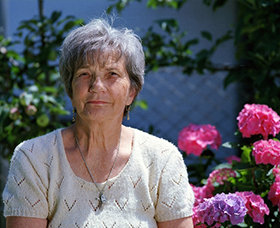 Cognitive decline is a normal part of aging, but as the world's population of older adults grows, researchers are looking at ways to prevent it.
Cognitive decline is a normal part of aging, but as the world's population of older adults grows, researchers are looking at ways to prevent it.
SEPT. 19, 2016
"UA Partners on Study to Improve Cognition in Older Adults"
Researchers from two of the states with the fastest-growing populations of older adults will partner on a study of a possible intervention for preventing, halting or reversing cognitive decline.


